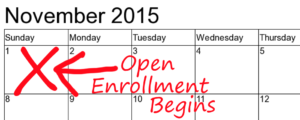A few weeks ago, the federal government announced that people in the 37 states that use Healthcare.gov would have access to a tax season special enrollment period (SEP) if they were unaware of the ACA’s penalty for being uninsured, and found out about it at the time they filed their taxes – which could be up to two months after the regular open enrollment period ended on February 15.
Consumer advocacy groups applauded this move, as it helps people avoid facing an even higher penalty in 2015 – which would otherwise be the case for people who didn’t enroll by February 15 (or the extension date in their state). And over the following couple weeks, just about every state-run exchange announced a similar tax season special enrollment period.
 But today, Connect for Health Colorado confirmed in an emailed press release that they will NOT offer a special enrollment period for people who owe a tax penalty for being uninsured in 2014. Idaho is the only other state that has also confirmed they will not have a tax season SEP, although it’s generally believed that Massachusetts will not either, since they’ve had an individual mandate and accompanying tax penalty for several years already – their residents are already used to this stuff.
But today, Connect for Health Colorado confirmed in an emailed press release that they will NOT offer a special enrollment period for people who owe a tax penalty for being uninsured in 2014. Idaho is the only other state that has also confirmed they will not have a tax season SEP, although it’s generally believed that Massachusetts will not either, since they’ve had an individual mandate and accompanying tax penalty for several years already – their residents are already used to this stuff.
The decision was made by the Colorado Division of Insurance (not the exchange). Insurance Commissioner Marguerite Salazar noted that
“After considering all the factors and consulting with Connect for Health Colorado, the Division determined that the negatives of starting up another enrollment period outweighed the positives. Open enrollment lasted for three months and everyone – Connect for Health Colorado, the carriers, brokers and health coverage guides – was on-alert.”
Fair enough. Here are the reasons that the Division of Insurance gave for not following the tax season SEP trend:
- Increased costs for the exchange. The estimate was that the additional staffing and programming changes could cost up to $100,000, and could also delay technology improvements that the exchange had planned for the “off season”
- Increased costs for Carriers – Not only would the carriers in the exchange have to spend more on call centers and enrollment processing, these costs would also apply to off-exchange carriers because Colorado statute requires off-exchange carriers to adhere to the same enrollment periods that the exchange uses.
- Increased costs for navigator groups – Connect for Health Colorado funds assistance sites and staffs them with health coverage guides who help people enroll. Those sites have been winding down their staffing now that open enrollment is over, and the exchange would have to ramp up their funding to cover a tax season SEP.
- It would be unfair to those who enrolled between November 15 and February 15 and are already paying premiums for their 2015 coverage. (note: This one seems a little odd to me… true, those who enrolled during the regular enrollment period are already paying premiums, but they’re also getting health coverage in return, which the uninsured do not have. And a lot of the people who enroll during tax season SEPs in other states are still going to have to pay a prorated penalty for 2015. That’s because in almost every state – including Colorado – you have to enroll by March 15 to get coverage effective April 1. March 15 is on the early end for the tax season SEPs in most states, and people who enroll after that will have coverage effective May 1 or June 1. But you’re only allowed a gap of up to three months in coverage without a penalty. If you have a four month gap (January through April, for example), you’ll pay a prorated penalty that amounts to one third of the total annual penalty for 2015.)
- It would be impossible to limit the SEP only to people who pay a tax penalty for being uninsured in 2014. (note: I agree completely with this one. There’s no system in place to verify that people actually paid the penalty for 2014. In the states that are offering tax season SEPs, you just have to “attest” that you didn’t know about the penalty prior to filing your taxes, and that you were assessed a penalty for 2014. But it’s on the honor system, for sure.)
Last week, Connect for Health Colorado posted a message on Facebook reminding people that the exchange is still available to help those who started their enrollment by February 15 but weren’t able to complete it. Unlike many states that put a hard deadline on wrapping up those enrollments, Connect for Health Colorado has basically just said that they’ll help everyone finish. So if you started – or tried to start – your application by February 15, contact the exchange and see if you can get help finishing it.


